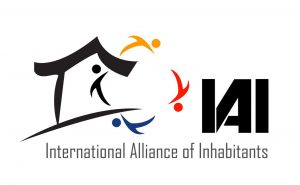
Description: The International Alliance of Inhabitants (IAI)/USA Canada Alliance of Inhabitants (USACAI) fight against evictions worldwide. We do this through World Zero Evictions in the month of October and Tribunals on Evictions
Mission:
On September 12th 2003, representatives of urban social associations and movements from various sides of the world met in Madrid to discuss on how jointly stand against the perverse effects of exclusion, poverty, environmental degradation, exploitation, violence, and problems related to transportation, housing and urban governance produced by the neo-liberal globalisation.
Hence, the establishment of the International Alliance of Inhabitants (IAI) was decided, based on the Charter of the Founding Principles which states the importance to strengthen the voice of the voiceless, from the local to the global level, as a strategic tool to build and boost the solidarity links needed to protect the inhabitants’ right to be builders and users of cities.
Thus, the IAI was born as a network of grassroots associations of inhabitants and territorial social movements; an intercultural, inclusive, autonomous, independent, self managing, and solidarity movement, readily available to coordinate with other similar organizations which pursue the same goals.
The IAI fits in the process promoted by the World Assembly of the Citizens for a Responsible and Solidarity World, and by the World Social Forum , embracing the motto “Another World is Possible ”.
The IAI is made of associations and social movements of inhabitants, communities, tenants, house owners, homeless people, favelas and informal settlements residents, cooperatives, indigenous populations and working class neighbourhoods of different world regions.
Outreach: International/National/Regional
Right to the City Components:
- 1. Non Discrimination
- 2. Inclusive Citizenship
- 3. Quality Public Spaces and Services
- 4. Enhanced Political Participation
- 5. Fulfilling its social functions
- 6. Quality Public Spaces and Services
- 7. Diverse and Inclusive Economies
- 8. Sustainable Cities with inclusive rural-urban linkages
Working groups:
- Advocacy
- Communication
- Regional
Website: www.habitants.org




